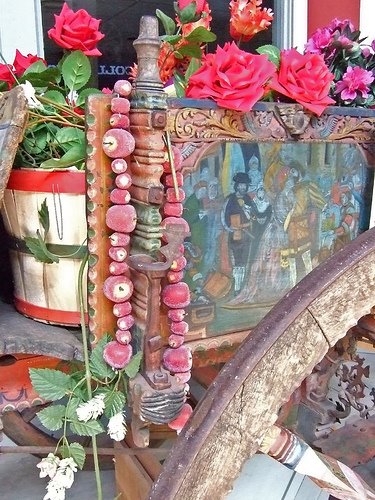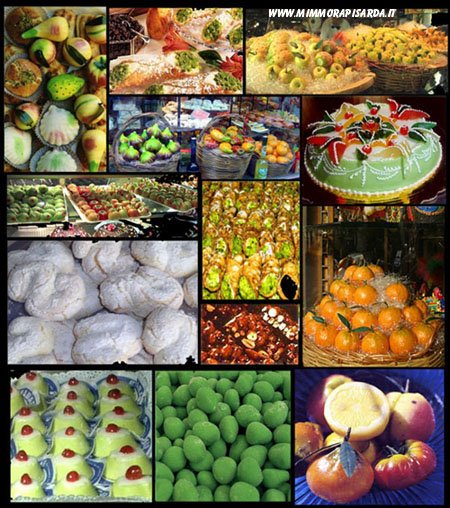
Eco-friendly Sicilian village uses donkeys to help collect garbage
The hours aren't bad. They're strictly union: 7 a.m to 6 p.m., six days a week. And the job comes with benefits: a personal assistant, sunbaths in the park, photographs, generous maternity leave.
The job location is decidedly attractive, the peaceful and picturesque Sicilian town of Castelbuono, nestled in the hills just 10 miles from the Tyrrhenian Sea. The climate is Mediterranean.
The job location is decidedly attractive, the peaceful and picturesque Sicilian town of Castelbuono, nestled in the hills just 10 miles from the Tyrrhenian Sea. The climate is Mediterranean.
Candidates for the position must be female, with a strong back and long ears.
...Long ears?
Yes, because the newest employees in Castelbuono are donkeys — Teresa, Valentina, Cosima and Damiana — to be specific. Since February, three of the donkeys (Damiana is presently on maternity leave) have been walking the narrow streets of the old town every morning, helping to collect garbage door-to-door.
"We are saving money," Mario Cicero, the mayor, proudly told ABC News. "The service is just as efficient, and the children love them!" The idea of using the donkeys came to Cicero, 45, late last year. "Yes, the idea was mine. It's patented!" he laughed.
Always seeking new ways to be more ecological and beautify his town, Castelbuono's environmentally conscious mayor has been at work for 10 years in various capacities to make this town of 10,000 residents a model of environmental respect. The town is listed among the top 11 in Italy for environmental quality by the Lega Ambiente, or Environmental League.
Recycling the garbage began in Castelbuono in 1996 and is so successful that the town now separates 42 percent of its waste. "We are one of the most virtuous towns in the country," Cicero exclaimed, with his Sicilian inflection. It was after he became mayor in 2002 that Cicero decided to remove all the ugly, malodorous garbage containers in the historic part of Castelbuono and replace them with door-to-door daily collection of differentiated waste.
The citizens of Castelbuono responded and started separating their garbage, putting it on their doorsteps every morning.
The citizens of Castelbuono responded and started separating their garbage, putting it on their doorsteps every morning.
But that was not enough. "I thought about what went on in the historic center of town," recalled the mayor, "where the tourists come across these trucks spewing diesel fumes and stinking of garbage. They block the traffic, too. So I thought, why can't we use something traditional, like our donkeys?"
So now in the small streets of the old town the rhythmic sound of donkey hooves has replaced the rumble and smell of the trucks.
So now in the small streets of the old town the rhythmic sound of donkey hooves has replaced the rumble and smell of the trucks.
The day starts early for the donkeys as they get groomed and saddled in the little public park on the edge of town. Breakfast is stale bread, prepared for them by their caretaker, Vincenzo Mazzola, a local expert in all things equine. For the moment, the donkeys live in the park.
"I like to let them loose as much as possible," said Mazzola, so afternoons are often spent grazing on empty plots on the outskirts of town. The local agriculture school is preparing proper quarters for them.
"They are all Sicilian donkeys," explained the jovial Mazzola. "We only keep females, because they are generally more docile, and they produce milk and foals."
Donkey milk, it turns out, is a blessing for babies and young children who are allergic to cow's milk. "It's an excellent milk, very sweet, and good for nursing mothers and babies," said Mazzola.
The donkey venture was given a lot of thought. It is not just about charm. "It is educational for the kids, selling milk will provide money for the school, and it is a service to the community," explained the mayor.
At the park, each of the three donkeys is saddled with a leather and blanket affair, and big wooden boxes are tied on either side. The town first tried the more traditional baskets, but those were too deep to reach into. So it settled on boxes — the same kind that 50 years ago were used to transport sand, rocks and other building materials (the bottoms have a hinge and fall open).
At around 7:30 a.m., the three donkeys set out for their routes, each one accompanied by a garbage collector. The men who partner with the donkeys all volunteered and seem both amused and resigned to the task. "You are walking instead of driving," said Mario Citta, "but as long as I have a job …"
"I like to let them loose as much as possible," said Mazzola, so afternoons are often spent grazing on empty plots on the outskirts of town. The local agriculture school is preparing proper quarters for them.
"They are all Sicilian donkeys," explained the jovial Mazzola. "We only keep females, because they are generally more docile, and they produce milk and foals."
Donkey milk, it turns out, is a blessing for babies and young children who are allergic to cow's milk. "It's an excellent milk, very sweet, and good for nursing mothers and babies," said Mazzola.
The donkey venture was given a lot of thought. It is not just about charm. "It is educational for the kids, selling milk will provide money for the school, and it is a service to the community," explained the mayor.
At the park, each of the three donkeys is saddled with a leather and blanket affair, and big wooden boxes are tied on either side. The town first tried the more traditional baskets, but those were too deep to reach into. So it settled on boxes — the same kind that 50 years ago were used to transport sand, rocks and other building materials (the bottoms have a hinge and fall open).
At around 7:30 a.m., the three donkeys set out for their routes, each one accompanied by a garbage collector. The men who partner with the donkeys all volunteered and seem both amused and resigned to the task. "You are walking instead of driving," said Mario Citta, "but as long as I have a job …"
Dressed in his bright orange reflective jumpsuit, Citta leads a somewhat reluctant Valentina through the old narrow streets of Castelbuono, pulling her up the hills and stopping here and there to pick up the small bags of rubbish and throw them in the boxes, taking care to keep the weight even on both sides.
"Today we are collecting 'umido,'" Citta explained. "Umido" is what they call organic waste, which will eventually be composted in the planned compost plant. On other days, recycling and "undifferentiated" garbage is picked up. When the boxes were full, Citta stopped at a garbage container on the edge of town and emptied them out.
"Today we are collecting 'umido,'" Citta explained. "Umido" is what they call organic waste, which will eventually be composted in the planned compost plant. On other days, recycling and "undifferentiated" garbage is picked up. When the boxes were full, Citta stopped at a garbage container on the edge of town and emptied them out.
Women look out for the donkeys from their balconies, and lower their garbage on a string, which Citta dutifully unhooks and drops in the boxes. One woman called to her little boy to come out and see the donkey. "It's a good thing," the elderly Rosario Fiasconaro said, watching from the doorstep. "They come every morning and pick up the bags. It's better than the garbage cans."
But not all the residents of Castelbuono approve. "The townspeople were originally very skeptical," said local police officer Vincenzo Fiasconaro as he watched the donkeys being saddled. "But many people have changed their minds."
But not one resident, who sneered as a donkey passed by. He had a mule 50 years ago "out of necessity, but now there are cars! And the donkeys escape and could kick someone."
He predicted that if the city council changes (elections are May 14) the donkeys will go, "and I hope it changes," he said, as he handed out campaign stickers for the opposing candidate for mayor.
And a street sweeper grumbled that it is all just a publicity gimmick for the mayor, who is up for re-election. "The donkeys take twice as long to do the job," he said.
But Cicero insisted the donkeys are just as efficient and more economical as the "traditional" means of garbage collection. "Three donkeys and three men do the work of two small trucks with four men," he explained. A donkey costs around $1,600 to purchase, compared with $40,000 for a truck. And a truck lasts about five years. A donkey can work until it retires at age 24 or 25. The town is also saving $380 a month in diesel fuel.
But not all the residents of Castelbuono approve. "The townspeople were originally very skeptical," said local police officer Vincenzo Fiasconaro as he watched the donkeys being saddled. "But many people have changed their minds."
But not one resident, who sneered as a donkey passed by. He had a mule 50 years ago "out of necessity, but now there are cars! And the donkeys escape and could kick someone."
He predicted that if the city council changes (elections are May 14) the donkeys will go, "and I hope it changes," he said, as he handed out campaign stickers for the opposing candidate for mayor.
And a street sweeper grumbled that it is all just a publicity gimmick for the mayor, who is up for re-election. "The donkeys take twice as long to do the job," he said.
But Cicero insisted the donkeys are just as efficient and more economical as the "traditional" means of garbage collection. "Three donkeys and three men do the work of two small trucks with four men," he explained. A donkey costs around $1,600 to purchase, compared with $40,000 for a truck. And a truck lasts about five years. A donkey can work until it retires at age 24 or 25. The town is also saving $380 a month in diesel fuel.
But it is not only a question of saving money or improving the environment, as the mayor is very well aware. He has also found something to distinguish Castelbuono from other charming hill towns.
"I also think that if we want Castelbuono to become a tourist attraction, and we cannot compete with places like Palermo or Taormina, we have to have something that is both useful and unique, Cicero said. "In Palermo, you won't see donkeys collecting garbage, but at Castelbuono you will."
"I also think that if we want Castelbuono to become a tourist attraction, and we cannot compete with places like Palermo or Taormina, we have to have something that is both useful and unique, Cicero said. "In Palermo, you won't see donkeys collecting garbage, but at Castelbuono you will."
But like many public administration jobs in Italy, the fate of Castelbuono's donkeys depends on this Monday's elections. "If I am re-elected, they certainly stay," said Cicero. "I don't think a new administration would put the garbage cans back in the streets, and I doubt they would send the donkeys away. But I have no way of knowing."

![Reblog this post [with Zemanta]](http://img.zemanta.com/reblog_c.png?x-id=3dfff7be-9947-48f0-9331-1b6324c2b412)






I think it is a great idea! saves money and doesn't emit toxic gases into the air. Why can't old traditions exist in modern times? I think its very innovative! cheers to the Castelbuono Mayor Cicero!! I hope he was re-elected.
ReplyDeleteHi Lisa, I think you will be pleased to know that this programme still exists and the donkeys are happily collecting the garbage. I even drove past one when I was last in Castelbuono (to visit a holy relic that legend says was on display in the chapel of the famous castle there; blog post coming soon).
ReplyDeleteIt was beautiful.